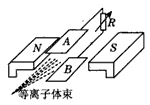问题
不定项选择
磁流体发电是一项新兴技术,它可以把气体的内能直接转化为电能,如图是它的示意图。平行金属板A、B之间有一个很强的匀强磁场,磁感应强度为B,将一束等离子体(即高温下电离的气体,含有大量正、负带电粒子)垂直于B的方向喷入磁场,每个离子的速度为v,电荷量大小为q,A、B两板间距为d,稳定时下列说法中正确的是

A.图中A板是电源的正极
B.图中B板是电源的正极
C.电源的电动势为Bvq
D.电源的电动势为Bvd
答案
BD
